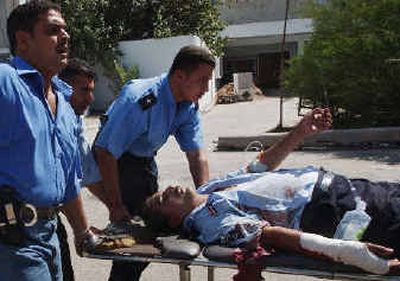Suicide bombings, clashes leave dozens dead in Iraq

BAGHDAD, Iraq – A suicide car bomber slammed into a line of police cars sealing off a Baghdad neighborhood Friday as American troops rounded up dozens of suspected militants, capping a day of violence across Iraq that left at least 52 dead.
Among the 63 suspects arrested were Syrians, Sudanese and Egyptians, officials said. Coalition forces say foreign fighters are playing a major role in the insurgency.
The car bombing, which killed three people and wounded 23, was the second this week targeting the capital’s beleaguered police forces. The mounting violence has increased pressure on Iraqis working to restore stability in their country but seen as collaborators because of their cooperation with U.S. forces.
U.S. forces intercepted another car earlier carrying explosives as it attempted to break through a Baghdad checkpoint, the military said. When the vehicle refused to stop, troops opened fire, setting off the explosives. The two people inside the vehicle were killed and an Iraqi soldier was wounded.
The attacks came after U.S. jets pounded suspected hideouts of an al Qaeda-linked group in and around the insurgent stronghold of Fallujah in Anbar province west of Baghadad, killing at least 44 people.
Also Friday, the military said insurgents killed a U.S. Marine on patrol in Anbar province. It gave no details. As of Thursday, 1,027 members of the U.S. military have died since the beginning of the Iraq campaign, according to the Defense Department.
A half-dozen cars were blocking a bridge in central Baghdad when a car rammed into them and exploded in the middle of the parked cars, police officials said.
“I was thrown outside my car,” said a policeman, Ali Jabar, who was being treated at a hospital for wounds to his face and one hand. He blamed insurgents waging a 17-month campaign to oust U.S.-led coalition forces.
“By attacking Iraqi police, they think that they will be sent to heaven, but by God’s will, they are now melting in hell,” Jabar said.
A wave of bombings, mortar attacks and shootings targeting police and potential recruits has killed hundreds of people nationwide since the fall of Baghdad in March 2003, as militants try to thwart efforts to build a strong Iraqi police force capable of taking over security from American troops. More than 250 people have been killed across Iraq in the past week alone.
The car exploded in the heart of one of Baghdad’s busiest commercial areas, a short distance away from the storied al-Moutanabi street, whose outdoor book market attracts large numbers on Fridays. When police fired shots to disperse the crowds, thousands of shoppers streamed from the area.
“I saw human flesh and blood in the street, then I fled,” said Mouayad Shehab.
The blast left a 6-foot-wide crater and littered the area with debris, including at least five artillery shells that police said came from the suicide car. Parts of the car, believed to be an old Chevrolet Malibu, were found more than a 100 yards away, witnesses said.
The police vehicles had been deployed to help American troops seal off the area around Haifa Street, where U.S. and Iraqi forces were raiding suspected insurgent hideouts, sparking a gunbattle.
Along with the 63 arrests, security forces seized rockets, grenades and machine guns, Interior Ministry spokesman Sabah Kadhim said. At least 10 people were wounded in the raids, according to the Health Ministry.
West of Baghdad, hundreds of men dug mass graves to bury the dead from a wave of American airstrikes that started late Thursday and stretched into Friday in and around Fallujah. Health Ministry official Saad al-Amili said at least 44 people were killed and 27 wounded in the Fallujah strikes.
The U.S. military said intelligence reports estimated up to 60 militants may have been killed. American troops have not entered Fallujah since ending a three-week siege of the city in April, and the claim could not be verified.
Mahmoud Sheil, 50, a tribal sheik in the area, likened the killings from U.S. airstrikes in Fallujah to the slaughter of civilians under Saddam Hussein’s ousted dictatorship.
“They (the Americans) say that Saddam is the man of mass graves, but they are the ones responsible for these mass graves,” he said.
Blood seeped through the blankets and sheets wrapping the corpses, which were lowered into the graves in groups of four.
The U.S. military said a first series of strikes targeted a compound in a village south of Fallujah where up to 90 militants loyal to Jordanian-born terror mastermind Abu Musab al-Zarqawi were believed to be hold up.
In other developments Friday:
“ British troops took control of the offices of Muqtada al-Sadr in the southern city of Basra on Friday after clashing with militants loyal to the rebel cleric, witnesses said. An Associated Press reporter saw British forces storm the offices. A British military spokesman said one British soldier was wounded in the clashes, but he was unable to confirm the building had been seized.
“ In the north, the governor of Salahuddin province said his convoy came under attack Friday near Tikrit, Saddam’s hometown. “I escaped today from an assassination attempt,” said Gov. Hamad Hamoud Shagtti.
“ A U.S. delegation headed by Alan Larson, undersecretary of state for economic affairs, arrived in Baghdad for two days of talks with Iraqi officials on economic issues, including debt rescheduling.
“ Two Americans abducted this week by Iraqi gunmen were identified as Jack Hensley and Eugene Armstrong and a Briton seized with them was identified as Kenneth Bigley. They are among more than 100 foreigners kidnapped in Iraq.